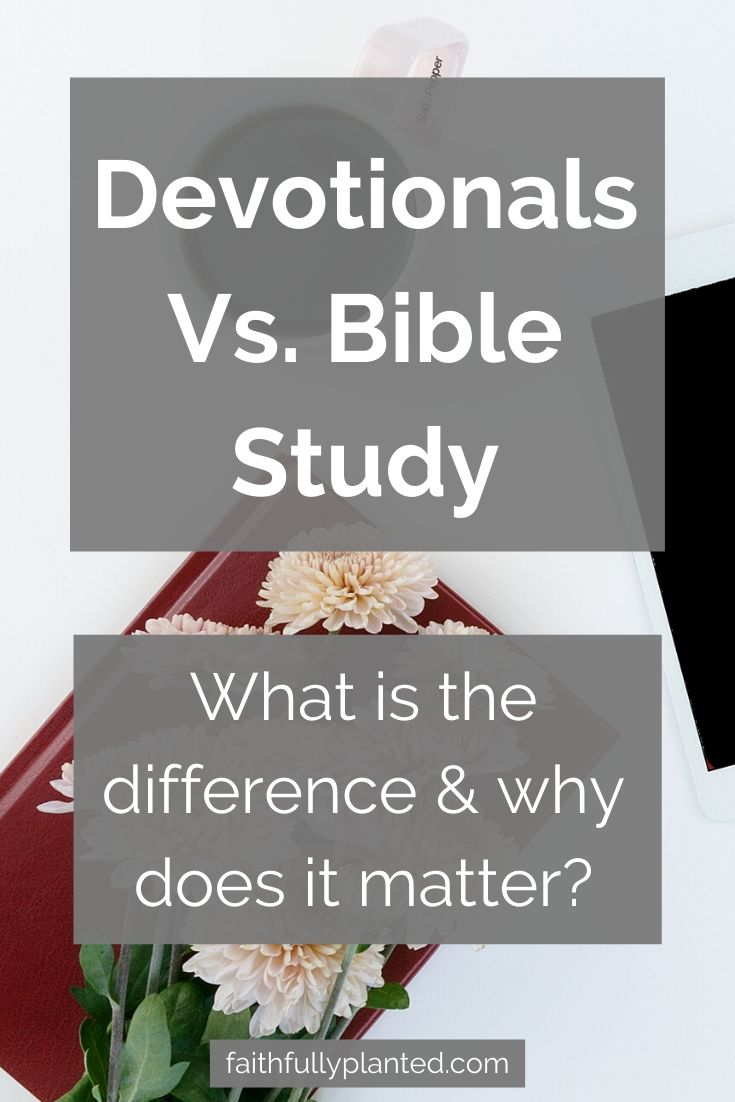Devotionals Vs. Bible Study: Why They Are Not The Same Thing

Have you ever wondered what the difference is between a devotional and bible study is?
Have you been thinking they were the same thing? If you have, you’re not alone.
Most of us are not taught how to read and study our Bibles for ourselves. There are churches and programs out there doing a wonderful job of this, but a large majority of us are missing this crucial skill.
Being taught the Bible is not the same as being taught how to study the Bible for ourselves. And reading a daily devotional is not the same as studying the Bible.
There are a lot of mindset blocks that keep us from seeking out this skill. We have the ability to learn how, but we don’t think we have the time to learn. There are classes and books and teachers readily available to us, but if we’re honest, learning to do it for ourselves can be low on the priority list.
So, we buy pretty devotionals and read the few verses and encouraging words printed in their pages and call it a day.
And please hear me, devotionals are not wrong. They are wonderful tools that can grow us and encourage us. But, they are not the same thing as studying the Bible for yourself.
There are many seasons we will go through that are particularly time-consuming and require a larger portion of our time and attention. We will go through spiritual dry spells. We will go through seasons where our capacity to learn is limited.
Those are the seasons where devotionals can keep us connected to Scripture and can keep us in the habit of going to the Word every day.
True as this is, devotionals are not as deep or as meaningful as uncovering the truth of God’s word for yourself. And when you’ve done the work to study and learn on your own, the seasons spent using devotionals will be even more fruitful because you’ll already know the context and be able to filter the devotional through your own knowledge.
So, let’s define our terms.
Devotionals are works by someone else that take a verse or passage and pulls application, meaning, or teaching out to share with others. This could be a devotional book, a social media post, an email, video or other forms of content. The big key of a devotional is that the ideas are being given to you by someone else and usually, the Scripture reading or verse is a small percentage of what you’re reading.
Personal Bible study is when you read and observe a whole passage, chapter or book and seek to gain understanding, meaning, insight or application for yourself. While Bible studies may also include outside teaching or resources, the idea of a study requires action and effort on the part of the student, with any teaching or outside resource being a supplement and not the focus.
There are many different methods for Bible study, including topical, chronological, historical, etc.
An important marker of a true Bible study is that it requires study on your part. It requires critical, deep thinking about the text and generally requires more reading than just a verse or two.
So, what are the other key differences between devotionals vs. Bible study? And what are the benefits of one over the other? Let’s dive in!

Devotionals are passive, whereas Bible study is active.
One of the biggest differences is that a devotional is all packaged up and ‘done-for-you.’ Someone else has done the work of researching and diving into context and history and put together a beautiful message for you.
They are passive because all you have to do is consume the content.
Studying the Bible for yourself is active. It requires you to do the work and to dig into the Scriptures for yourself. Is it harder? Is it slower? Absolutely. That’s part of the reason why it is so fruitful to do it for yourself.
When you work through a passage on your own (with or without study resources) that effort allows your brain and your heart to more deeply take in that message. Doing the work for yourself creates pathways in your brain for you to encode what you are reading and learning in a more meaningful way.
There is a reason that most learning environments require you to engage with the material in tangible ways, such as writing or presenting or engaging in group discussion. When you actively engage with the presented material, you are more likely to remember and use that material when you walk away from it.
Devotionals take less time but also bear less fruit.
A big pro for devotionals is that since they are passive, they take less time. They can be completed in mere minutes.
They are perfect for busy seasons or stages of your life where you are in transition, such as moving or bringing a new baby home or starting a new job or school. Because they take far less time, they are more accessible in seasons when doing a long, more time-consuming Bible study may seem impossible. They keep us connected to His Word when the world tries to pull us away.
Devotionals are like buying fresh, pre-chopped produce and personal Bible study is like growing produce in your own garden. Devotionals are like fast-food and personal Bible study is like preparing for yourself a gourmet, 5-course meal.
When you buy produce, you buy just enough for your family. You have just enough to get by for the week. When you grow your own, there is abundance. There is a whole harvest. You have so much that you give much of your fruit away or can it for later use.
Devotionals are the same way. Devotionals are just enough to get you by for the moment, but deep personal BIble study will sustain for a lifetime. There is an abundance to be found there when you do the work.
Devotionals pull Scripture out of context and that is a slippery slope.
One of my biggest cautions for relying on devotionals for your Scripture intake is that devotionals generally pull verses and passages out of context. While the teaching may include some of the background, you lose the context of reading within the chapter or book for yourself.
Many devotional writers are reliable and theologically sound. But, there are many that are not. The issue here is that without undertaking personal Bible study, you won’t know the difference.
It’s important for Christians to be engaging with God’s Word in a personal way and not just through someone else’s words so that the Holy Spirit can teach, illuminate, convict and encourage you individually.
Studying the Bible for yourself regularly also allows you to evaluate whether teaching is aligned with what Scripture actually says and discern false teachers.
This is not to condemn you if you’ve been relying on devotionals, but instead to challenge you to step out of your comfort zone and grow.
If you’re not sure where to start, get yourself in my email community. I’ve got some incredible resources coming out soon that you are going to want to know about. PLUS you’ll get access to all the free resources I have while you’re waiting! Drop your email in the box below this post 🙂










2 Comments